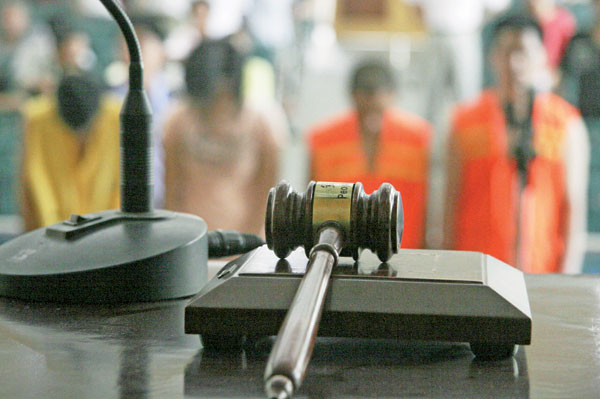Revised criminal law to give suspects greater protection
Updated: 2012-03-12 07:34
By Zhao Yinan (China Daily)
|
|||||||||||
Cautious, courageous
At the time of his arrest, Zhang Guoxi, held a key post in the construction department of a government-funded holiday village in Ningbo, a booming city in East China's Zhejiang province.
|
Timeline 1954 Criminal Procedure Law is first listed on the country's legislation agenda. 1956 Work starts on the first draft of the law. 1957 Drafting of the law is halted as China is enveloped in political unrest. 1962 A working panel of about 20 members is set up to resume drafting the law. 1963 Drafting is again halted in the early stages of the "cultural revolution" (1966-76). 1979 Drafting is resumed and Criminal Procedure Law is put into force, 25 years after the project was initiated. 1996 About 100 clauses are added in an amendment to keep the law up to date with social and economic developments. |
According to records released after his trial in March last year, anti-corruption officers detained him without a warrant. The suspect said he was interrogated for three days, first in a hotel room and then in a prosecutor's office, and was given only a few hours of sleep.
He said that at no time did investigators produce documents authorizing his detention or take any written testimony.
After three months, Zhang said he was transferred to a detention house in Shaoxing, where he was allowed to sleep four hours a day.
"They made me assemble strings of colored lights, fixing 100 colored bulbs to a 8-meter-long cable," he told China Daily on March 6. "I had to finish at least 27 strings every day, which was impossible for a new hand. I kept working until my fingers were blistered."
When the case reached the courtroom, prosecutors for Ningbo's Yinzhou district accused Zhang of taking 76,000 yuan from contractors in exchange for lucrative construction projects between 2005 and 2008. As evidence, they presented a signed confession.
However, the defendant said he had received only 6,000 yuan, while his attorney, Jiang Jiangao, said his client's testimony had been illegally extracted with the use of violence.
In an unprecedented move, the panel of three judges sided with the defendant and threw out the confession. Court records quote the presiding judge as saying that the initial investigation into Zhang was "flawed" and that the "testimony should be excluded".
The panel went on to return a guilty verdict, yet as the "value and harm (of the bribes) were minimal", the defendant received no criminal punishment. He was, however, sacked from his job.
In an interview with China Daily last week, Jiang, who is currently appealing 42-year-old Zhang's conviction at an intermediate court, called the decision to reject the signed confession "cautious but courageous", and said it "casts light on future judicial rulings".
Soon after the events in Ningbo, the Supreme People's Court also issued a warning to law enforcement agencies to prevent forced confessions.
"I've heard that judges in other places have failed to (dismiss disputed evidence) under similar circumstances, either because they were fearful about challenging prosecutors or just disregarded procedural justice," said Chen Guangzhong, a leading expert on criminal proceedings.
If the NPC votes to approve the revised law, analysts say it will not only provide institutional support for similar rulings, but it will also be the first time China's 30-year-old criminal procedure code has embodied the constitutional spirit of protecting human rights.
Li Zhaoxing, spokesman for the NPC, told a news conference that the draft to be tabled at this year's plenary session identifies human rights protection as an essential principle.
"It's slow progress," admitted law professor Chen Weidong at Renmin University of China, "but legislation is a gradual thing, in which improvements are made little by little."
Today's Top News
President Xi confident in recovery from quake
H7N9 update: 104 cases, 21 deaths
Telecom workers restore links
Coal mine blast kills 18 in Jilin
Intl scholarship puts China on the map
More bird flu patients discharged
Gold loses sheen, but still a safe bet
US 'turns blind eye to human rights'
Hot Topics
Lunar probe , China growth forecasts, Emission rules get tougher, China seen through 'colored lens', International board,
Editor's Picks

|

|

|

|

|

|






